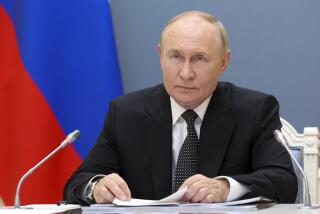Rights Group Assails Moscow Expulsions
- Share via
MOSCOW — Helsinki Watch, a top U.S.-based human rights group, on Wednesday protested the deportation by Moscow’s mayor of thousands of residents from the Transcaucasus in recent days as part of a general crackdown on crime here.
With the Russian capital under a state of emergency, enforced by nearly 5,000 extra troops in the wake of last week’s political violence, Mayor Yuri Luzhkov has vowed to take advantage of the beefed-up forces to purge the city of criminals.
But police and troops are carrying out the cleanup by openly discriminating against Azerbaijanis, Armenians, Chechens, Georgians and other ethnic groups from the Caucasus Mountains, Helsinki Watch asserted, noting that reports abound that authorities are acting with unjustifiable brutality, beating detainees and tearing up their identity papers.
Worst of all, the group said, Moscow authorities are acting on the basis of what is in itself a violation of the basic human right of freedom of movement--the infamous Moscow propiska , or residence permit. Authorities have expelled nearly 5,000 people without residence permits in the last week.
“The Moscow propiska system mainly affects individuals from the Caucasus or Central Asia,” Helsinki Watch Director Jeri Laber wrote in a letter of protest to Luzhkov. “Justifying the system by invoking the need to fight crime effectively equates entire ethno-national groups with criminals and amounts to collective punishment against such groups.”
Moscow police argue that people from the Caucasus are statistically more likely to commit crimes, with a reported 40% of Moscow crimes committed by out-of-towners.
Traffic police have said they were ordered to single out swarthy people who appear as if they are from the Caucasus for document checks with possible deportation in mind.
“Most of these Caucasus people are thieves and robbers,” Andrei Shchavelev, a traffic police spokesman, told the daily Moscow Times. “They commit two-thirds of the crime in the city. We have plenty of our own criminals here.”
Police also do not hide, however, that they often share widespread Russian prejudice against the Caucasus nationals, based on the belief that many wheel and deal and somehow grow rich at Russians’ expense. Russian resentment surfaces particularly at farmers’ markets and in private stores when high prices enrage customers long used to Soviet price controls.
“First of all, I feel a strong physical dislike for them,” economist Olga Vyrodova said of Caucasus natives in a fairly typical expression of Russian hostility.
Also, she said, “they occupied all the marketplaces in Moscow and raised the prices to the skies. They’re very active in crime and racketeering. . . . It’s a very good thing Moscow is getting rid of them.”
Those who lack a propiska are generally held for a day or two in police stations, then shipped back to their native countries by plane or train. The Georgian, Armenian and Azerbaijani embassies in Moscow have complained about police treatment of their citizens, but to no apparent effect.
Moscow’s Central Market, normally a boisterous cornucopia of vendors selling colorful fruit and vegetables, is a shadow of itself these days. Half the stalls are empty; salespeople, lacking their usual cocky smiles, tell stories of merciless harassment.
“They even beat us,” said Penahi Mamedov, an Azerbaijani who said he had been beaten twice and was now hawking 10 last cans of caviar. “One guy even got taken away on a stretcher. Even if you have a propiska , they kick you out. They say, ‘Go back where you came from.’
“They have no right,” he said. “We’re not beasts. . . . My kidneys hurt, my stomach hurts. It’s impossible.”
Human rights activists say many of the Caucasus and Central Asian nationals are in Moscow because they escaped from violence at home.
More to Read
Sign up for Essential California
The most important California stories and recommendations in your inbox every morning.
You may occasionally receive promotional content from the Los Angeles Times.













